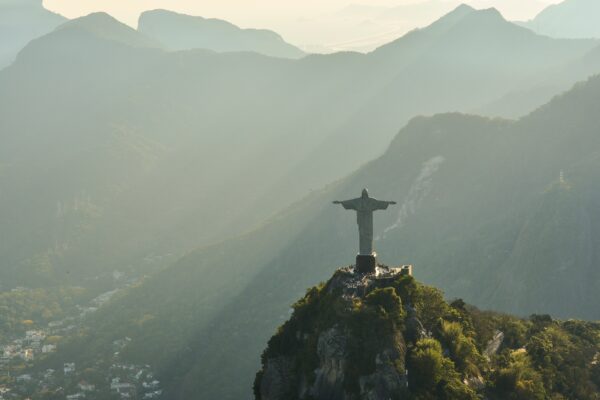“If we don’t laugh, we’ll cry”: São Paulo UoM student on poverty, democracy and life in Brazil
By wilfbutler

Maju Muchon is bright and giggly. It feels like she’s going to burst into laughter at any given moment. She often does. A laugh of gentleness, joy, and reassurance. It’s the quality I find most striking when I speak to her. Particularly considering the issues she speaks to me about.
Maju is a first-year psychology student at The University of Manchester from Brazil.
The grey, cold wetness of Oxford Road, where we meet, feels far away from her hometown of São Paulo. But to her, the pressing crises facing Brazil are not. Attempting to explain and give a dense opinion on the state of Brazil over the last few years is no easy challenge, but Maju gives it a good go.
We start with poverty – one of the most pressing issues in Brazil.
“Places where poorer people live and where rich people live are completely different,” she begins. “It’s two different worlds. You can see how criminality has increased over the last few years.”
Back home in São Paulo, Maju volunteers for a Non-Governmental Organisation (NGO) that teaches Maths and Portuguese to children from the most vulnerable backgrounds – often in favelas with no other chance at an education.
“You can see how they struggle,” she tells me. “They only went there because there was food, not so much for studying.” The young children, Maju says, often can’t answer the basic questions. “They don’t know the principles of Portuguese. If a maths problem is hidden within a sentence, they can’t do it.”
“This was a major problem after the pandemic,” she continues. Like most parts of the Global South, closing schools had hugely negative consequences for children. Scarce and unequal access to technology meant children, like the ones Maju volunteers with, were largely locked out of learning at all, often for months at a time.
The poverty and sense of desperation Maju tells me about is hardly surprising: some 17 million children in Brazil live in poverty, 5.8 million of which are considered in extreme poverty. These numbers have gone up and down over the last few decades.

Photo: World Economic Forum @ Flickr
Brazil’s new president, Luis Inácio Lula da Silva, began his presidency in January 2023 with a hefty in-tray. His first term as president (2003-2010) was marked by one of the most radical anti-poverty campaigns in Latin American history. Programmes like Bolsa Família led to millions being lifted out of hardship. Child malnutrition decreased by 46% during Lula’s tenure.
Lula was lauded both in Brazil – with some of the highest approval ratings of any president – as well as in the international community. In 2010, he was awarded the title of “World Champion in the Fight Against Hunger” by the UN’s World Food Programme. Obama once called him the most popular politician on Earth.
But Maju, being of a much younger generation, was not volunteering for an NGO during these golden years. Instead, she has seen firsthand how poverty in Brazil has both gotten worse and how it has changed in nature. Brazilians are increasingly dependent on the gig economy: working for a food delivery app, for example, provides consistent work but with low wages and few rights.
“If you work for one of these apps, you need to work for about fourteen hours a day to get less than a minimum wage,” Maju says. “It’s insane. It masks the problem with unemployment.” During the Bolsonaro years, poverty expanded. The UN hunger map tracks countries where at least 2.5% of the population struggles to eat. In 2014, Brazil was taken off the list, thanks largely to the success of the Lula years. But this success was all but wiped from the history books when the pandemic struck. Brazil was put back on the map, with more than 15% of the population not knowing where their next meal would come from each day.
Bolsonaro’s defeat in the 2022 elections was placed largely down to his failures to protect the most vulnerable. The kind of poverty Maju tells me about caused a pain that ran deep across Brazil. When Lula ran for a second shot at high office, he inspired people by persuading people that poverty isn’t inevitable, natural or undefeatable.
But can Lula raise the same soufflé twice? When he was president in the early 2000s, he benefited from a thriving global economy. He certainly steered the ship in the right direction, but his ship this time around is in far choppier waters. The global economy is dire, and inflation has hit Brazil like much of the world.

But Maju tells me she’s still optimistic. “The next year will be really hard,” she admits. “The budget for this year was already settled by Bolsonaro, so it’s very limited. But it will get better, slowly, every year things should improve.” When she says this, I can’t help but wonder if she’s speaking honestly, or trying to convince herself. Higher prices aren’t just a problem for Brazil’s poorest, however. “When I talk to my friends, it’s our biggest concern. Things are getting pricier and pricier.”
In fact, the issue of high prices, Maju tells me, is a particular issue for Brazilians studying at UoM. With the value of the Brazilian Real against the sterling taking a hit in recent months, money has become increasingly anxiety-inducing. “Most of the Brazilian students don’t have any support from the uni, they usually look for a job and everything. It’s a really difficult situation for us. But the £170 from the university was a huge help,” she adds.
Next to poverty, another pressing crisis in Brazil is the threat to democracy. Bolsonaro’s politics has consistently been fuelled by lies and populism. The social media age has given rise to a toxic environment, in which people can comfortably live in their own ideological bubbles. Tech giants like Meta profit as citizens are fed destructive, untruthful and harmful content that splinters a once-shared understanding of reality. Democracies, particularly in the Global South, are no longer on a stable trajectory of progress.
This came to a dangerous head on 8th January this year in Brasilia, when Bolsonaristas tried to invade the capital city’s top institutions. While democracy was robust enough to fend off the threat, it was a reminder to the world of the new era social media has ushered in. Maju agrees: “It was a wake-up call on what Lula faces. But the threat comes more from the public,” she thinks – indeed, Bolsonaro still won the support of 49.1% of the public.
During the pandemic, Bolsonaro spread conspiracies that led to distrust in the government. Misinformation about vaccines, questioning the existence of the disease and the effectiveness of lockdowns contributed to Brazil having the fifth highest death toll in the world. But the conspiracies didn’t end with the pandemic – as the elections loomed, Bolsonaro began to question the security of electronic voting. “It’s so secure. Every year, the government pays people to probe the system to find faults, but they’ve never found anything. But people didn’t believe the result,” Maju sighs.
Maju tells me about a friend whose mum was in Brasilia on January 8, supporting Bolsonaro in the crowds. His mother doesn’t know he voted for Lula. “He’s afraid. It’s really sad,” she explains. “You can see these two movements. They have such different beliefs. The division means people stop talking with each other.” Where this division will go is not clear; it will likely cause deep damage before it goes away.
Despite the depressing circumstances that Maju tells me about, she remains strikingly cheerful. She has an impressive ability to laugh about particularly distressing accounts of corruption or violence, whilst remaining sensitive to the people affected. I wonder how she stays so positive.
“I think that’s a Brazilian thing. It’s not that we’re happy with this, but I would say that Brazilians have a way to face this situation because we have struggled with so many things in history. We faced a dictatorship. We faced slavery. Now we have a president who will fight. All there’s left to do is laugh. We laugh while we criticise them,” she says, grinning.
She pauses for a moment. “If we don’t laugh, we’ll cry.”







